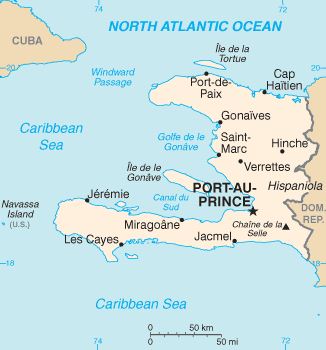 "Heartlessness!"
"Heartlessness!"
Harry F'ouche', a former Haitian Consul-General in New York, was expressing outrage triggered by a decision of the Dominican Republic's constitutional court that stripped tens of thousands, perhaps as many as 200,000 Dominicans of Haitian descent of their citizenship of the Spanish-speaking country.
"An outrage. It is the issue of the day for members of the Haitian Diaspora in the United States, whether in New York, Miami or elsewhere in the United State. Indeed, it is what Haitians at home are most concerned about today," asserted Ricot Dupuy, General Manager of Radio Soleil, one of the leading French Creole radio station in New York serving the large Haitian community. It's racist and illegal. It goes against the provisions of international conventions."
Fouche', who served as Haiti's Consul-General during the administration of President Jean Bertrand Aristide between 2003-2004 but who is now head of the Consortium for Haitian Empowerment, said that it was unfathomable that the Dominican Republic's Constitutional Court would take such a cruel step as ruling that the children of immigrants who have been in the Spanish-speaking Republic next door to Haiti all of their lives would suffer such a calamity.
"It is illegal and racist to exclude people who have been living in a country for so long, some dating back to 1929, on the grounds that they are not citizens of that country," insisted Fouche'. "These are people, including thousands of children who were born and raised in the Dominican Republic and who don't know any other country than the DR. We must protest against this action."
The Santo Domingo court decided that Haitian immigrant children who had been registered as Dominicans going back to 1929 would not be considered as Dominicans because their parents were said to be in transit. The Dominican court action evoked a strong response from the United Nations. The UN Office of the High Commissioner for Refugees in Geneva has called on the DR to ensure that citizens of Haitian origin in the Spanish-speaking country were not deprived of their right to nationality.
"We are concerned that a ruling of the Dominican Republic Constitutional Court may deprive tens of thousands of people of nationality, virtually all of them of Haitian descent, and have a very negative impact on other rights," said Ravina Shamdasani, spokesperson of the UN Human rights office in Geneva.
In the Caribbean, Irwin LaRocque, Caricom's Secretary-General, said that the implications of the court's ruling were of grave concern for the Caribbean Community to which Haiti belongs.
"I gather there are more than 20,000 Dominican nationals of Haitian extract who would be affected," said the Secretary-General.
Anything that affected any member of the regional body would be of concern to the Caribbean., he added. The case, "raises a serious question about the status of the numerous people."
That was why Trinidad and Tobago Prime Minister, Kamla Persad-Bissessar, the current chairman of Caricom, is being pressed by one of her country's top daily papers to "make time for an ugly crisis engulfing two member states of Cariforum, which shares membership with Caricom" that she currently heads.
"The ruling, which is not subject to appeal, denies citizenship to an estimated 200,000 plus residents born in the country (DR) but to Haitian parents," stated the paper. "Suddenly this segment of the population appears to have been reduced to a condition of statelessness.
"People born in the Dominican Republic, with nowhere else to call home, have been plunged into bewilderment, in desperate hope that the international community will come to their rescue," charged the Express.
Next door to the DR, the ruling stirred the anger of people and the Foreign Affairs Ministry in Port au Prince, stated that Haitians and their Dominican descendants have contributed significantly to the current progress" of their neighbor through their work and sacrifice, but were now being treated as foreigners in transit. It was a regrettable state of affairs according to the government of President Michel Martelly.
From his home in Chicago, Fouche' blamed racism for the decision to exclude Haitians who have been living in the DR for several decades.
"There is no other country in the world in recent times which have treated people in that outrageous and illegal fashion," said Fouche' whose Consortium is at the forefront of protests in the U.S. "The tragedy is that it was aimed at people of color who were born and raised in the DR, people, who know no other place as their home."
Dupuy, who keeps his fingers on the pulse of the Haitian Diaspora in the United States, especially in New York believes there was an economic factor that drove the court's decision.
"Haiti is really the bread basket of the Dominican Republic, buying as much as $ 2 billion in goods and services from Haiti," he explained. "The International Monetary Fund stated that in 1995, Haiti bought $500 million in goods and services from the DR but between 2011 and 2012, the trade skyrocketed to $2.2 billion. A recent decision by the Martelly administration to limit the flow of goods from the DR to products which are safe for human consumption may have triggered the decision. Whatever caused it, the reason was racist, unfair and must be reversed. It is illegal pure and simple. How can you tell people who were born and raised in a country and know no other birthplace that they don't have the rights that citizenship brings."
Protests are being planned in the U.S. to send a strong message to the Dominican Republic and to Washington, said Fouche'.
Portland and Seattle
Free Subscription to Breaking News
Free Subscription to Breaking News




















































































































































































































































































































































